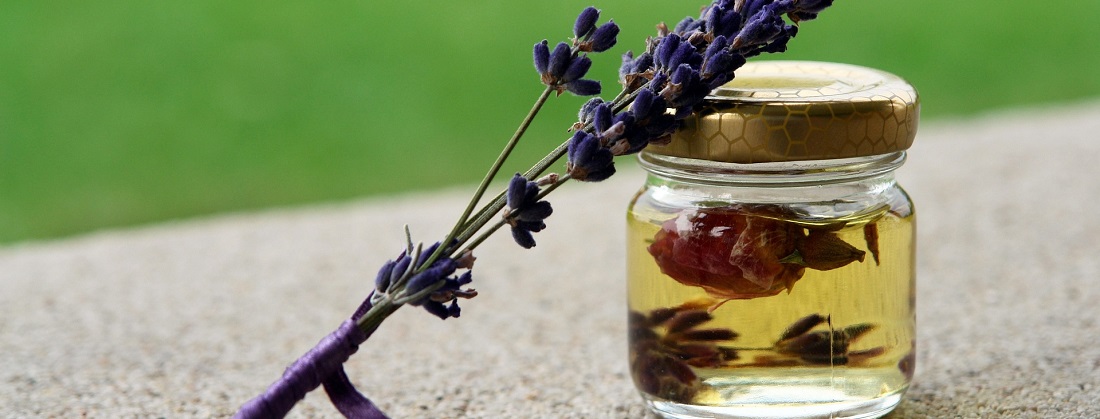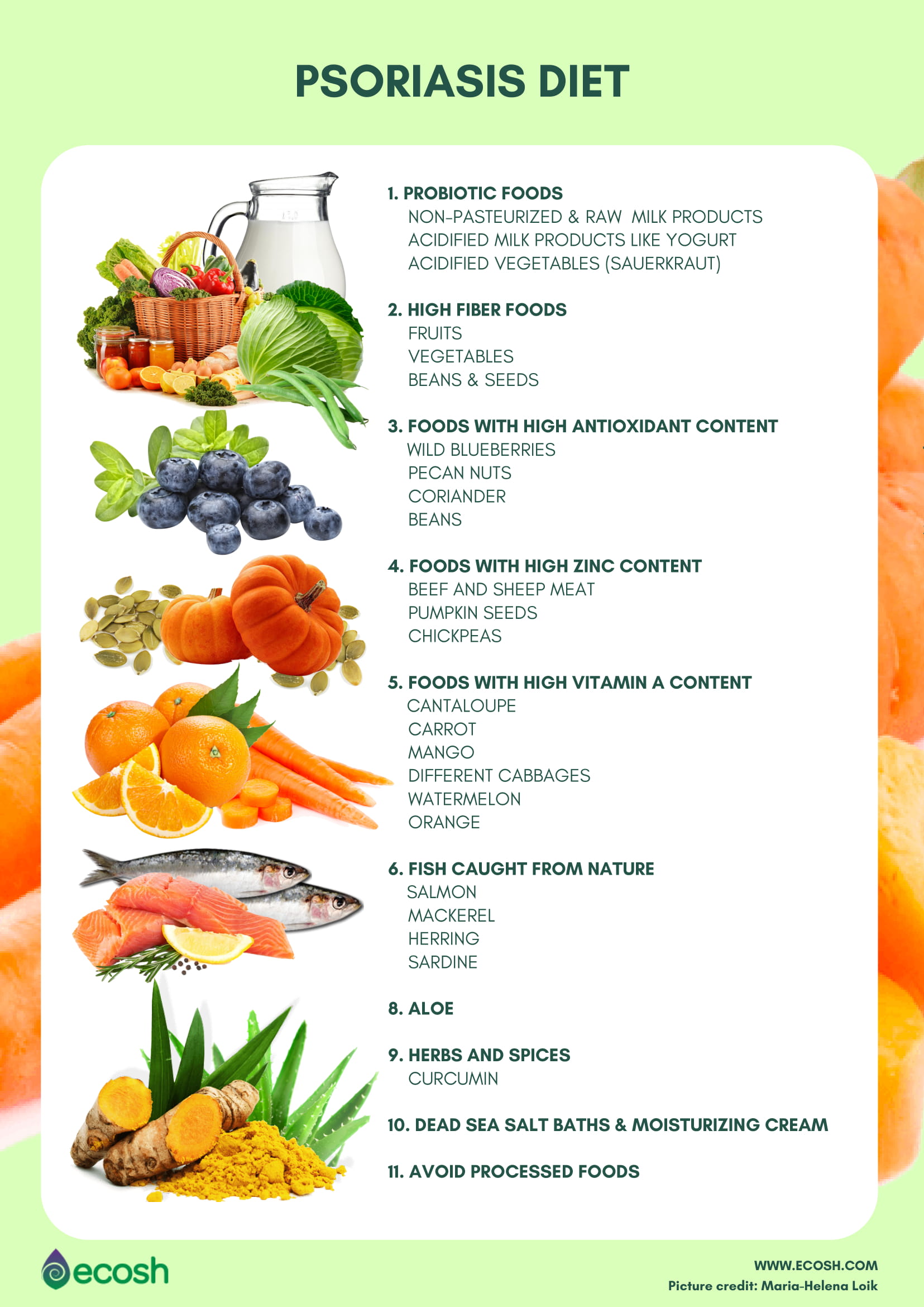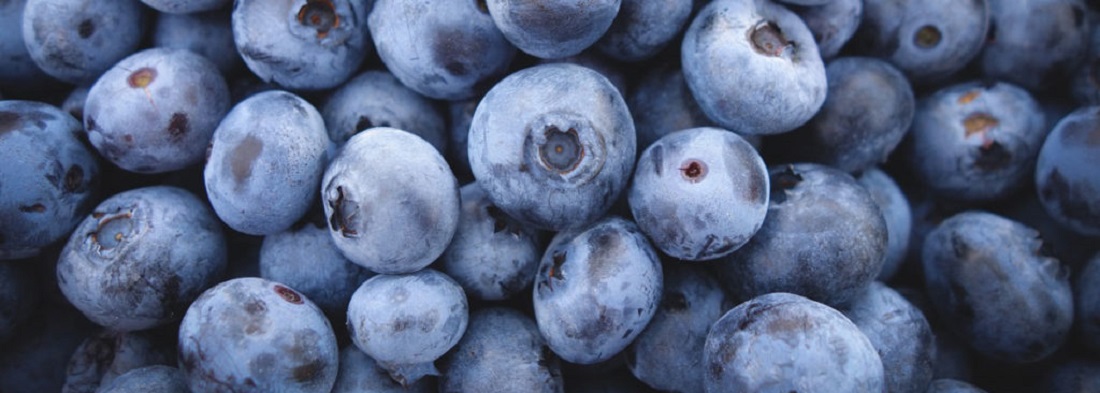PSORIASIS – SYMPTOMS, CAUSES, HOME REMEDIES FOR NATURAL PSORIASIS TREATMENT AND PSORIASIS DIET
Psoriasis is a common chronic skin condition that causes raised, red, scaly patches to appear on the skin and occurs in approximately 2 to 2.6% of the US population. It is a skin disease that accelerates the life cycle of skin cells and causes cells to build up rapidly on the surface of the skin.
Psoriasis may take shape in various forms, each with its symptoms and seriousness level. For instance, psoriasis is often considered as only a skin condition, however, it can also cause psoriatic arthritis. Studies have also shown that patients with psoriasis often have a weakened intestinal barrier, or a leaky gut syndrome (1). Therefore, there can be many different accompanying health conditions.
Conventional treatment can be very useful, however, sometimes it`s not the only solution or only gives a non-permanent effect as it does not treat the cause of the disease. Therefore, there are also many natural remedies for your overall health to relieve this disease, and the psoriasis diet is one of them. Above all, the right diet for this health condition and your overall well-being can be very important.

Psoriasis Symptoms
Signs and symptoms are different for everyone, the most common signs and symptoms include:
- Red patches (few spots or major eruptions that cover large areas) of skin, usually covered with thick, silvery, or dandruff-like white scales.
- Loose or damaged skin, which may be sensitive, itchy, and painful.
- Dandruff on the scalp.
- Split, pigmented skin that can cause bleeding and bruising.
- Discolouration of finger and toenails or formation of fungal nail infection.
- Detachment of the nail plate from the nail bad and pain or bleeding in this area.
- Dry, cracked skin that may bleed.
- Itching, burning, or soreness.
- Thickened, pitted, or ridged nails.
- Swollen and stiff joints.
- Small scaling spots (commonly seen in children).
- In addition, many patients also have emotional problems because they are ashamed of their skin and feel hopeless.
The rash that occurs as a result of psoriasis is most common on the:
- Elbows
- Legs
- Scalp and face
- Lower back
- Palms of your hand and soles of your feet
- In addition, it can also occur elsewhere, such as finger and toenails, genitals, and mucous membranes of the mouth (2, 3, 4).

Psoriasis Causes
The causes of psoriasis aren’t fully known. However, it’s believed that psoriasis might be an immune system issue with T cells and other white blood cells (neutrophils).
For instance, in a balanced and healthy body, white blood cells are organized to fight infections and attack as well as destroy invading bacteria. However, in the case of this disease, white blood cells (T cells) mistakenly attack the skin cells.
This attack causes the production process of skin cells to go into excessive activity which causes new skin cells to develop too quickly. So, on the skin’s surface, these new skin cells pile up.
The process becomes an ongoing cycle and the new skin cells move to the outermost layer of skin too quickly – in days rather than weeks. In conclusion, skin cells will build up in thick, scaly patches on the skin’s surface, keeping going until treatment stops the cycle.
Although the causes of this disease aren’t entirely clear, researchers believe the factors that play a role in psoriasis development can be genetics as well as environmental.
However, many physicians have also spotted several aggravating factors. In other words, psoriasis generally starts or aggravates because of some trigger that you may be able to spot and avoid.
Factors that may trigger psoriasis include:
- Poor diet
- Abnormal small bowel permeability and problems with protein digestion
- Increase in the number of T cells in the blood, in the dermis, and the epidermis
- Stress
- Hormonal changes and heredity
- Vitamin D deficiency
- Disorders of liver function
- Infections, such as strep throat or skin infections
- Injury to the skin, such as a cut or scrape, a bug bite, or a severe sunburn
- Smoking and heavy alcohol consumption
- In addition, certain medications — including lithium, which is prescribed for bipolar disorder, high blood pressure medications such as beta-blockers, antimalarial drugs, and iodides (2, 3, 4).

Types of Psoriasis
There are several types of this disease which include:
- Plaque psoriasis: this type causes dry, raised, red skin lesions (plaques) covered with silvery scales. They can occur anywhere on your body (genitals and the soft tissue inside your mouth).
- Nail psoriasis: it can affect fingernails and toenails, causing pitting, abnormal nail growth, and discoloration. Infected nails might loosen and separate from the nail bed (onycholysis).
- Guttate psoriasis: This type primarily affects young adults and children. It’s marked by small, water-drop-shaped, scaling lesions on your trunk, arms, legs, and scalp.
- Inverse psoriasis: this mainly affects the skin in the armpits, in the groin, under the breasts, and around the genitals. Inverse psoriasis causes smooth patches of red, inflamed skin that worsen with friction and sweating. Fungal infections may trigger this type.
- Pustular psoriasis: this form can occur in widespread patches or smaller areas on your hands, feet, or fingertips. The blisters may come and go frequently.
- Erythrodermic psoriasis: erythrodermic psoriasis can cover your entire body with a red, peeling rash that can itch or burn intensely.
- Psoriatic arthritis: in addition to inflamed, scaly skin, psoriatic arthritis causes swollen, painful joints that are typical of arthritis. Psoriatic arthritis can affect any joint (5).

Psoriasis Treatment
Common Psoriasis Treatment in Conventional Medicine
In conventional medicine, the physician will take into account the severity of the case, the psoriasis type, and the size of psoriasis when prescribing. Therefore, if one practice of treatment is not efficient enough, gives side effects, or does not give any results at all, it is usually changed.
All these medicines should be used only under a doctor’s supervision and only in limited amounts to avoid side effects as they might be seriously worrying.
Side effects of some psoriasis medication:
- Folliculitis, a pimple-like rash affecting the hair follicles
- Burning, dryness, irritation, and thinning of the skin
- Increased risk for birth defects and cancer.
Topical treatments for psoriasis
Topical remedies are usually applied directly into the affected skin, these treatments include:
- Salicylic acid
- steroid-based creams
- Calcitriol (Vectical) containing topical ointment
- Coal-tar ointments and shampoos
- Prescription retinoids (3).

Oral and injectable medications for psoriasis
When other treatments fail, some doctors prescribe oral or injectable drugs to treat this disease. However, some of these may influence the immune system.
- Methotrexate
- Oral retinoids
- Biologics which include adalimumab (Humira), brodalumab (Siliq) etanercept (Enbrel), guselkumab (Tremfya) ixekizumab (Taltz), secukinumab (Cosentyx), and ustekinumab (Stelara), apremilast (Otezla) (3).
Phototherapy for psoriasis
For continual, problematic-to-treat cases of this health condition, many physicians recommend light therapy. But even consistent amounts of ordinary sunlight (not that much to create sunburn) may help many psoriasis patients.
- PUVA (the drug psoralen combined with ultraviolet A, or UVA, light)
- Ultraviolet B light (UVB) light
- Narrow-band UVB therapy (3).

Psoriasis Treatment – Natural Therapies, Home Remedies and Psoriasis Diet
1. Reduce Stress
Stress is an important part of this and every disease, so balancing therapies, meditation, and other stress-relief methods might be effective helpers (7, 8, 9).
There are many natural ways to relieve stress and even depression, just pick your favorite and start today.
2. Exercise, Drink Plenty of Water, Take Dead Sea Salt Baths and Moisturize Your Skin
It may sound too simple, but physical exercise, baths, and adequate water consumption are a few simple and effective ways to support the treatment. For instance, baths with different solutions, such as oil, Dead Sea salts, oiled oatmeal, or Epsom salts may relieve psoriasis, remove scales and ease itching. Mix the bath solutions in the bath as directed, then soak in the bath for about 15 minutes (3, 6, 7, 8). However, when taking a bath, do not use too hot water, as it may dry your skin and make the inflammation worse.
After taking a bath or showering, use moisturizing lotion or cream, for example, MyMim.Me Natural Highly Moisturizing & Anti- Aging Cream increases the moisture in the skin, which also has a calming and healing effect on psoriasis.
3. Natural Topical Medications
Preliminary studies suggest that cream containing avocado oil and vitamin B12 may relieve the symptoms (10). Also aloe vera extract 0.5% in a hydrophilic cream has shown promising results and is more effective than placebo. In addition, it has not shown toxic or any other objective side-effects (11).

4. Homeopathic Medicines and Other Alternative Therapies
Homeopathy is also one of the natural therapies which may be effective in alleviating psoriasis. According to Healthline, some homeopathic treatments may relieve the symptoms and improve the overall quality of life (12). Some psoriasis may also benefit from acupuncture and Chinese medicine (13, 14).
For instance, Chinese physicians may suggest herbal remedies, like turmeric, white turmeric (Rhizoma Zedoriae, similar to ginger), etc. (16, 17)
Ayurvedic admirers can try panchakarma treatment, which includes herbal supplements and nutrition therapy to cleanse your body of toxins (15).
5. Supplements For Psoriasis
When it comes to the treatment of psoriasis naturally, then undoubtedly the most important is to follow your doctor’s orders, but you may find help also from dietary supplements. According to several sources, there are some main supplements recommended for the internal treatment of this health condition. However, studies have not confirmed the effectiveness of all of them, so do not start to self-medicate and consult your doctor before taking any supplements.
- Hydrochloric acid (1-3 capsules per meal): helps break down proteins and reduce psoriasis exacerbations.
- Fish Oil and Omega 3 (1000-2000 grams per day): fish oil is anti-inflammatory and may support the treatment.
- Vitamin D3 (4000 IU daily): low levels of vitamin D are associated with psoriasis.
- Milk thistle (250 mg three times a day): milk thistle is also believed to help reduce inflammation and slow down excessive cell growth.
- Probiotics (50 billion units per day): probiotics improve digestion by increasing the number of beneficial bacteria and by eliminating harmful bacteria.
- Vitamin B12: many of the B-complex vitamins, including vitamin B-12, are necessary to maintain healthy skin. One possible connection between vitamin B-12 and psoriasis could be that low levels of vitamin B-12 may directly cause psoriasis. However, the currently available evidence does not support this theory (8, 18, 19, 20, 21, 36).

6. Essential Oils
Essential oils soothe the inflamed skin and may support the healing process. According to several sources, some of the most suggested essential oils for psoriasis include:
- Tea Tree oil: using tea tree oil for psoriasis prevents infection, lowers inflammation, and also stimulates the immune system to support skin health.
- Lavender oil: soothing and anti-inflammatory, soothes the skin, stimulates the formation and healing of the new skin.
- Frankincense oil: an antiseptic, anti-bacterial, antioxidant, and anti-inflammatory medication that will relieve discomfort.
- Myrrh oil: a great tool for rough, scaly, and split psoriasis spots.
- Geranium oil: geranium oil is an effective blood circulation stimulator and an anti-inflammatory agent. It also relieves stress.
- Rose oil: rose oil has anti-inflammatory effects which are great for soothing redness and for helping relieve sensitive skin (22, 23, 24, 25).
How to use essential oils?
You should always use essential oils well diluted and this is especially true if your skin is injured or you have conditions such as eczema or psoriasis. The right choice of base oil can add an important healing component to the essential oil blend. For instance, mix three drops of Lavender oil and three drops of Frankincense oil with a teaspoon of coconut oil and massage on your damaged skin.
Base oils for diluting essential oils
- Coconut oil: coconut oil has a very delicate anti-inflammatory and moisturizing effect.
- Argan oil: argan oil contains squalene, which helps lessen inflammation, rehydrate skin, prevent skin damage, and encourage wound healing
These essential oils can also be used successfully for anti-psoriasis aromatherapy or to be sprayed into the air as natural stress relievers.
 7. Foods to Avoid
7. Foods to Avoid
In the case of psoriasis, it might be helpful to leave some of the foods out of your menu as these may worsen the symptoms. However, talk with your doctor before starting any diet.
- Processed food: firstly, processed food is not good for anyone. Secondly, the nutrient content of processed food is low, while the content of harmful trans fats, fructose-rich corn syrup, artificial ingredients such as preservatives, artificial flavorings, thickeners, and other refined sugars is high. In addition, besides inducing addiction and overeating, processed foods may cause the worsening of psoriasis as well as other health conditions.
- Citrus fruits: although citrus fruits are usually considered a beneficial food to health, they may be allergens for some of us. Therefore, if you suspect some allergy, leave citrus fruits out of your diet and see if your skin condition improves. This means giving up grapefruit, orange, lemon, and lime for a while, and also the juices made of citruses.
- Tomatoes, potatoes, and peppers: be sure to avoid eating those because they contain solanine, a chemical compound that may cause pain and aggravate some psoriasis.
- Alcohol: alcoholic drinks widens the blood vessels of the skin. Therefore, the outcome of drinking is that white cells with T-cells that are linked with psoriasis are more easily released into the outer layers of the skin. A large number of T cells, therefore, attack normal skin cells, thereby inducing rapid renewal of skin cells characteristic of this condition.
- In addition, gluten: although the relationship between psoriasis and gluten has not yet been proven, some psoriasis patients have found that excluding gluten from the diet relieves the symptoms (28, 29, 30, 31, 32, 33, 36).

8. Foods Which You Should Eat Only in Moderation
If you’ve researched the list of prohibited and recommended foods, you’ve noticed that the foods listed below are often banned. However, don’t let yourself be discouraged by the label of “bad food” assigned to them, just be moderate and monitor your consumption more carefully.
- Red meat: red meats (also dairy and eggs) contain a polyunsaturated fatty acid called arachidonic acid. Research has demonstrated that by-products of arachidonic acid may have a role in creating psoriatic lesions.
- In conclusion, dairy products: as with red meat, it is also recommended to avoid dairy products as they contain arachidonic acid and one more inflammatory protein – casein. However, dairy products have also beneficial effects that should not be abandoned. Some of these effects are important for the body (28, 29, 30, 33, 34).

9. Psoriasis Diet
According to the US National Psoriasis Foundation, there is no sure diet plan that will heal psoriatic disease with certainty. However, there are several ways in which consuming healthy food may lessen the severity of symptoms. Several ingredients, foods, and diets have shown promise in their capability to help lessen or prevent inflammation in the body.
Therefore, making healthy eating choices may play a role in helping you relieve your psoriasis (31, 32, 36). It is important to consult your physician before you begin any diet.
In conclusion, the more you consume healing anti-inflammatory and antioxidant foods, the more your skin condition may improve.

Psoriasis Diet – How to Relieve Psoriasis Naturally
1. Probiotic foods
Consumption of high probiotic foods or probiotic supplements supports digestion, lowers inflammation, and increases immunity. Organic, acidified, and unpasteurized milk products, like kefir and yogurt, and acidified vegetables are one of the best foods that contain probiotics. Some studies made to research the benefits of probiotics on psoriasis and eczema also show promising results.
2. High Fiber Foods
These foods keep your digestive system functioning, support the natural detoxification processes and help to prevent and relieve constipation. Fruits, vegetables, beans, and seeds all contain high fibers.
3. Foods with high antioxidant content
The list of antioxidant-rich foods mostly matches the list of high fiber-rich foods, because it includes vegetables, fruits, herbs, beans, and nuts. At the top of the list of antioxidants are wild blueberries, pecan nuts, coriander, and beans.
4. Foods with high zinc content
Zinc is essential for skin health. There is some evidence that oral zinc may reduce some symptoms of psoriasis. Great zinc sources are beef and sheep meat, pumpkin seeds, kefir, and chickpeas.
5. Foods with high vitamin A content
Adding these orange or yellow foods to your daily diet increases the levels of vitamin A in your body that is essential for your skin to heal. For example, carrots, cantaloupes, mangos, tomatoes, different cabbages, and watermelons are all great sources of vitamin A.

6. Fish caught from nature
Herring, salmon, mackerel, and sardine are packed with vitamin D and omega-3 fatty acids, both of which have shown promising results in relieving psoriasis symptoms. For psoriasis, fish could be the main source of protein instead of meat and traditional dairy products.
7. Raw milk products
Raw milk might be a much healthier choice than pasteurized milk. Especially vitamin D and enzyme-rich raw milk products are the ones that may relieve psoriasis.
8. Herbs and spices
Some herbs and spices are anti-inflammatory and contain antioxidants. For example, the common turmeric (whose active ingredient is curcumin), is famous for its strong healing effect, is studied for its possible antipsoriatic properties, and is also approved as safe to use by the US Food and Drug Administration (FDA).
To know more about turmeric healing effects, read about The 22 Scientifically Proven Health Benefits of Curcumin Found in Turmeric.
9. In conclusion, aloe
Aloe has a soothing impact on your body, internally as well as externally, especially on your digestive system and skin. On the other hand, while some suggest that aloe may relieve psoriasis, some report that oral aloe vera in tablet form may be dangerous and cause kidney and digestive issues. Therefore, consult your physician before taking any aloe vera supplement (34, 35, 36, 37, 38, 39, 40, 41, 42, 43, 44, 45, 46, 47).

To Sum Up, Precautions
If you are taking an antipsoriatic regimen, consult your doctor before taking any dietary supplements or other natural medicines. Before taking any supplements, consult your doctor also in case you have any medical condition or if you are taking any medicine.
In other words, some supplements and herbs can interact with widely used prescription drugs, such as blood thinners and birth control pills.
During pregnancy or breastfeeding, you should consult your doctor before taking any conventional or natural antipsoriatic medicine.
When you use essential oils for treatment, firstly try the sample on a small spot on the skin, in case this oil will not suddenly cause allergies. Certainly, you must dilute essential oils in base oil (such as coconut oil) before using.
In addition, be extra careful when using essential oils, if you have sensitive skin in general.
NB! The information provided here is for informational purposes only, so do not consider it as health care or medical diagnosis and treatment. Do not consider this information as a guarantee of the results you want to achieve. In addition, this information here is not intended to replace the advice of your physician or other healthcare professional.
Even more, you should not use it to diagnose or treat a health problem. Before changing or discontinuing your existing medication, treatment, or care, or taking any dietary supplements, be sure to consult with your healthcare professional or doctor before starting any diet or program, or if you suspect you may have a medical condition.
Compiled by Maria- Helena Loik
This article was originally posted on Ecosh.com
Pictures: Pexels.com, Pixabay.com, Shutterstock.com
Sources:
- https://pubmed.ncbi.nlm.nih.gov/29908580/
- https://www.mayoclinic.org/diseases-conditions/psoriasis/symptoms-causes/syc-20355840
- https://www.webmd.com/skin-problems-and-treatments/psoriasis/understanding-psoriasis-treatment#1
- https://www.healthline.com/health/psoriasis#causes
- https://www.webmd.com/skin-problems-and-treatments/psoriasis/psoriasis-types
- https://www.mayoclinic.org/diseases-conditions/psoriasis/diagnosis-treatment/drc-20355845
- https://www.medicalnewstoday.com/articles/314525#home-remedies
- https://www.healthline.com/health/psoriasis/treat-symptoms-home#reduce-stress
- https://pubmed.ncbi.nlm.nih.gov/3279078/
- https://pubmed.ncbi.nlm.nih.gov/11586013/
- https://pubmed.ncbi.nlm.nih.gov/8765459/
- https://www.healthline.com/health/homeopathic-remedies-for-psoriasis#side-effects-and-precautions
- https://clinic.acumedic.com/can-we-help/condition/psoriasis/#:~:text=According%20to%20Chinese%20Medicine%20theory,are%20no%20bad%20side%2Deffects.
- https://www.medicalnewstoday.com/articles/325378#acupuncture-and-psoriasis
- https://www.hnwellness.com/panchakarma/panchakarma-for-psoriasis-ms/
- https://www.ncbi.nlm.nih.gov/pmc/articles/PMC5816303/
- https://www.medicalnewstoday.com/articles/314306#can-turmeric-treat-psoriasis
- https://www.psoriasis.org/dietary-modifications/#:~:text=Vitamin%20D%20topical%20ointments%20have,growth%20of%20the%20skin%27s%20cells.
- https://www.lifesourcevitamins.com/psoriasis-conditions-cures-p/nosku242.htm
- https://www.medicalnewstoday.com/articles/322491#symptoms
- https://www.webmd.com/vitamins/condition-1524/psoriasis
- https://www.healthline.com/health/essential-oils-for-psoriasis#argan-oil
- https://greatist.com/health/essential-oils-for-psoriasis#argan-oil
- https://www.naturalhealthnews.uk/article/qa-essential-oils-for-psoriasis/
- https://www.health.com/condition/psoriasis/essential-oils-for-psoriasis
- https://www.ncbi.nlm.nih.gov/pmc/articles/PMC6253993/
- https://www.ncbi.nlm.nih.gov/pmc/articles/PMC5796020/
- https://www.healthline.com/health/psoriasis/food-triggers-for-psoriasis#foods-to-eat
- https://www.medicalnewstoday.com/articles/314664#inflammation
- https://www.webmd.com/skin-problems-and-treatments/psoriasis/psoriasis-17/action-plan/find-psoriasis-flare-triggers
- https://www.psoriasis.org/dietary-modifications/
- https://www.psoriasis.org/advance/psoriasis-and-diet-researchers-examine-the-relationship/
- https://www.everydayhealth.com/psoriasis/diet/foods-to-avoid-if-you-have-psoriasis/
- https://onlinelibrary.wiley.com/doi/full/10.1111/bjd.15059
- https://www.healthline.com/health/psoriasis/probiotics-for-psoriasis#research
- https://www.ncbi.nlm.nih.gov/pmc/articles/PMC5453925/#:~:text=While%20some%20dietary%20elements%20are,vitamin%20D%20supplementation%2C%20and%20probiotics.
- https://greatist.com/health/psoriatic-arthritis-diet#foods-to-eat
- https://www.healthline.com/health/psoriasis-diet#avoid-alcohol
- http://projects.hsl.wisc.edu/SERVICE/modules/24/M24_CT_Psoriasis.pdf
- https://www.ncbi.nlm.nih.gov/pmc/articles/PMC3401858/
- https://www.longdom.org/open-access/psoriasis-and-fatsoluble-vitamins-a-review-2155-9554-1000421.pdf
- https://www.medicalnewstoday.com/articles/314306#can-turmeric-treat-psoriasis
- https://www.everydayhealth.com/psoriasis/can-turmeric-help-treat-psoriasis-other-skin-conditions/
- https://www.healthline.com/health/psoriasis/psoriasis-and-turmeric#what-the-research-says
- https://www.fda.gov/media/132575/download
- https://www.ncbi.nlm.nih.gov/pmc/articles/PMC5664031/#:~:text=Curcuminoids%20have%20been%20approved%20by,of%2095%25%20concentration%20of%20three
- https://www.healthline.com/health/aloe-vera-for-psoriasis#benefits-and-uses
